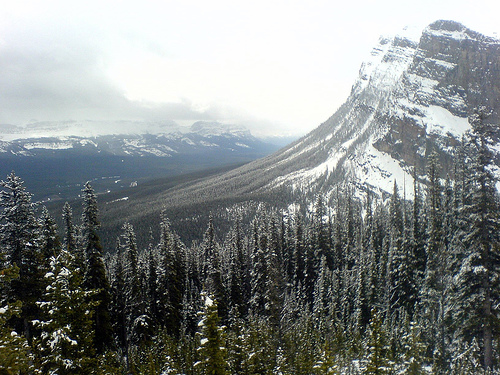 Did you know that the Rocky Mountains contain more oil than Saudi Arabia? Most people don’t. The problem is that, unlike the easily accessed and processed oceans of liquid oil under Middle Eastern sands, the Rocky Mountains’ petroleum is found in rocks called oil shale. Oil shale, which must be mined, is a type of sedimentary rock that releases oil when heated in specific types of chemical processes. The problem, according to environmental groups, is that producing energy from oil shale is even less environmentally friendly than using normal, liquid oil or even coal.
Did you know that the Rocky Mountains contain more oil than Saudi Arabia? Most people don’t. The problem is that, unlike the easily accessed and processed oceans of liquid oil under Middle Eastern sands, the Rocky Mountains’ petroleum is found in rocks called oil shale. Oil shale, which must be mined, is a type of sedimentary rock that releases oil when heated in specific types of chemical processes. The problem, according to environmental groups, is that producing energy from oil shale is even less environmentally friendly than using normal, liquid oil or even coal.
On January 14 of this year, days before the Obama administration took over, the Bush administration laid out hasty plans to quadruple the amount of land leased by the federal government for the development of this resource. Wednesday, Interior Secretary Ken Salazar scrapped this new policy, which would have allowed for oil shale research on 1.9 million acres in Colorado, Utah, and Wyoming. He stated that the former administration’s plans shortchanged American taxpayers on royalty rates and did not provide for sufficient oversight. He said the federal government will offer research leases in Colorado and Utah — where such a program, endorsed by Salazar in 2005 when he was a Colorado senator, already exists — “based on sound policy and public input.”
Opinion on this decision is divided. Predictably, environmental groups support Salazar’s decision, and oil companies are against it. Politicians from the affected areas fall on both sides of the question. The governor of Utah, his fellow Congressional Republicans, and at least one Democratic member of the House for that state were all disappointed as well, but Colorado’s governor supported Salazar’s decision. Interestingly, a number of local mayors also support Salazar, calling for significantly more oversight and study of the matter.
In the U.S., various companies are conducting research into oil shale’s viability, but the technology is still in its early stages. Shell Research & Production Co., which has been studying oil shale for several years now in this region, says that it will be at least 5 more years before they even know if oil shale development is economically feasible.
Photo Credit: r h at flickr





